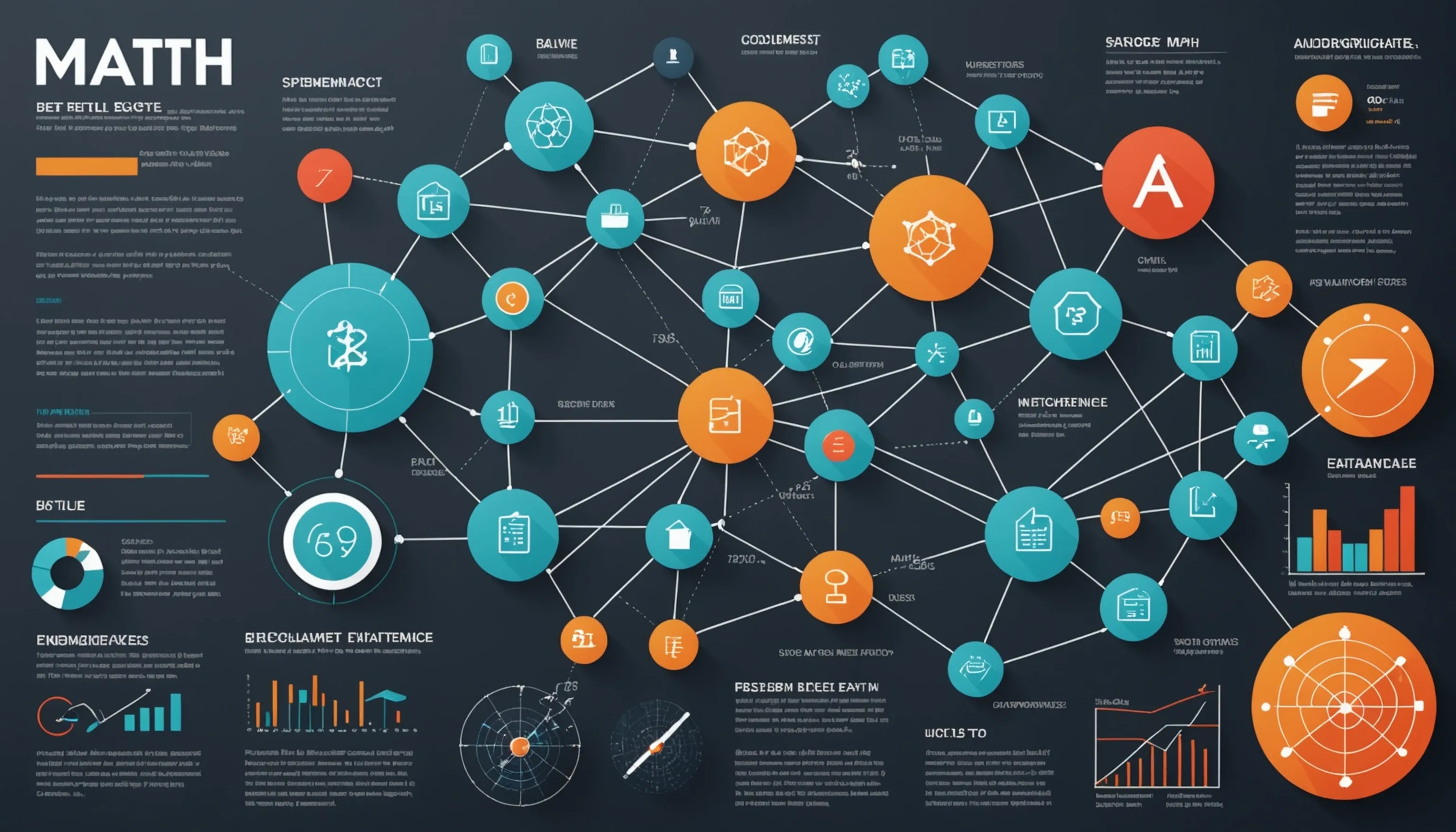Math is the Foundation of STEM
 HvWHenry van Wagenberg
HvWHenry van Wagenberg
The Importance of Math in STEM Education
Mathematics is the cornerstone of STEM education, playing a crucial role in shaping students' understanding of science, technology, engineering, and mathematics. A solid grasp of math concepts enables students to tackle complex problems and think analytically. This foundational knowledge is essential for conducting experiments, analyzing data, and developing technological solutions. Moreover, math fosters creativity and innovation, allowing students to approach challenges from various angles. By integrating math into STEM curricula, educators prepare students for future careers in high-demand fields, ensuring they have the skills necessary to succeed in an increasingly technical world.
Understanding STEM: What Does It Mean?
STEM stands for Science, Technology, Engineering, and Mathematics. It represents an integrated approach to education that emphasizes the interconnections among these fields. Understanding STEM is essential for preparing students for the complex challenges of the modern world, where interdisciplinary knowledge is increasingly valued.
At its core, STEM education promotes critical thinking, creativity, and collaboration. It encourages students to engage in hands-on learning experiences, applying theoretical concepts to real-world problems. For example, in a STEM curriculum, students might conduct scientific experiments, develop technological solutions, or design engineering projects that require mathematical reasoning.
Moreover, STEM is not just about individual subjects; it's about fostering a mindset that embraces inquiry and exploration. Students learn to ask questions, conduct research, and analyze results, which are vital skills in any career. This holistic approach helps students see the relevance of their studies in everyday life, making learning more engaging and meaningful.
In addition, understanding STEM is crucial for addressing global challenges, such as climate change, health crises, and technological advancements. A strong STEM foundation equips students with the skills to innovate and contribute positively to society. By promoting STEM education, we empower the next generation to become problem-solvers and critical thinkers, ready to tackle the challenges of tomorrow.

How Math Supports Science, Technology, and Engineering
Math serves as the backbone of Science, Technology, and Engineering (STEM) fields, providing essential tools and frameworks for understanding complex concepts. In science, mathematical principles are used to formulate hypotheses, analyze data, and interpret results. For example, statistics are crucial for evaluating experimental outcomes and determining the significance of findings. Understanding mathematical relationships allows scientists to model natural phenomena, leading to groundbreaking discoveries.
In technology, math is indispensable for developing algorithms, coding software, and creating digital applications. Engineers rely on mathematical calculations to design structures, systems, and processes that are both functional and efficient. From determining load-bearing capacities to optimizing resource allocation, math ensures that technological innovations are safe and effective.
Moreover, math fosters logical reasoning and problem-solving skills, which are vital in STEM careers. Students learn to approach challenges systematically, breaking down complex problems into manageable components. This analytical mindset is not only essential in technical fields but also applicable to everyday life.
Additionally, math encourages creativity in engineering and technology. By understanding mathematical concepts, students can devise innovative solutions and improve existing systems. For instance, mathematical modeling can help engineers predict how a new product will perform under various conditions, guiding design choices.
In summary, math is a critical support system for science, technology, and engineering, equipping students with the skills needed to excel in these dynamic fields.
Benefits of a Strong Math Foundation
Having a strong math foundation offers numerous benefits that extend beyond the classroom. First, it enhances problem-solving skills, enabling individuals to tackle complex challenges in various domains. Additionally, a solid grasp of math boosts critical thinking abilities, allowing for better decision-making and logical reasoning. In terms of career opportunities, strong math skills open doors to high-demand fields such as engineering, finance, and technology. Furthermore, math literacy fosters confidence in students, encouraging them to engage with more advanced concepts in STEM. Overall, a strong math foundation is essential for success in both academic and professional pursuits.

Enhanced Problem-Solving Skills
Enhanced problem-solving skills are one of the most significant benefits of a strong math foundation. These skills are not only crucial in academic settings but also in everyday life and various career paths. Math teaches students to approach problems systematically, breaking them down into smaller, manageable parts. This analytical approach allows for a clearer understanding of the problem at hand and leads to effective solutions.
In mathematics, students learn to identify patterns and relationships, which are essential for developing logical reasoning. For instance, solving equations requires recognizing how different variables interact, enabling students to make informed predictions and decisions. As they progress, they encounter increasingly complex problems that challenge their thinking and creativity.
Moreover, the process of solving math problems often involves trial and error. This encourages resilience and adaptability, as students learn to adjust their strategies when faced with obstacles. This mindset is invaluable, as it prepares them to tackle real-world challenges where solutions are not always straightforward.
In addition to academic benefits, enhanced problem-solving skills are highly sought after in the workforce. Employers in STEM fields, finance, healthcare, and technology prioritize candidates who can analyze situations, think critically, and devise innovative solutions. As a result, students with strong math skills are better equipped to succeed in a competitive job market.
In summary, a solid math foundation fosters enhanced problem-solving skills that benefit students academically and professionally, equipping them for future success.
Improved Critical Thinking Abilities
Improved critical thinking abilities are a vital outcome of a solid math foundation, serving as a cornerstone for success in both academic and professional realms. Mathematics encourages students to analyze information critically and make reasoned decisions based on data. Through various mathematical concepts, learners are taught to evaluate arguments, identify assumptions, and discern valid conclusions.
As students engage with mathematical problems, they are often required to approach them from multiple angles. This process fosters an environment where questioning and exploration are encouraged. For example, when tackling a complex equation, students must determine the best methods for solving it, weighing different approaches and outcomes. This practice enhances their analytical skills, which are crucial for effective problem-solving.
Additionally, math education emphasizes the importance of logical reasoning. Students learn to construct coherent arguments and justify their solutions using evidence, an essential skill in any discipline. This logical framework extends beyond mathematics, influencing how students interpret information in science, social studies, and everyday life.
Moreover, improved critical thinking abilities have significant implications for career readiness. Employers increasingly seek individuals who can think independently and make data-driven decisions. In fields such as technology, engineering, and healthcare, strong critical thinking skills enable professionals to navigate complex challenges and devise innovative solutions.
In summary, a robust math foundation not only enhances critical thinking abilities but also prepares students to thrive in diverse environments, making them valuable assets in any career.
Career Opportunities in STEM Fields
Career opportunities in STEM fields are vast and diverse, reflecting the increasing demand for skilled professionals in science, technology, engineering, and mathematics. Jobs in these areas often offer competitive salaries and growth potential. For instance, roles such as data scientists, software engineers, and biomedical engineers are highly sought after. Additionally, careers in renewable energy, artificial intelligence, and healthcare technology are on the rise, driven by innovation and societal needs. A strong math foundation is essential for success in these careers, as it equips individuals with the analytical and problem-solving skills necessary to excel in dynamic environments.
High-Demand Jobs Requiring Math Skills
High-demand jobs requiring math skills span a variety of industries, reflecting the essential role that mathematics plays in modern careers. As technology advances and industries evolve, the need for professionals equipped with strong mathematical abilities continues to grow. Some of the most sought-after positions include:
- Data Scientist: Data scientists analyze complex datasets to extract valuable insights. Proficiency in statistics and mathematical modeling is crucial for interpreting data trends and making informed business decisions.
- Software Engineer: Software engineers design and develop applications, often utilizing algorithms and mathematical logic to solve programming challenges. Strong math skills aid in optimizing code and improving system performance.
- Financial Analyst: Financial analysts use mathematical techniques to evaluate investment opportunities and assess financial performance. Skills in statistics and quantitative analysis are vital for forecasting trends and making strategic recommendations.
- Actuary: Actuaries assess risk using mathematical models and statistical analysis, primarily in the insurance and finance sectors. Their ability to predict future events based on data is critical for effective decision-making.
- Engineer: Various engineering disciplines, including civil, mechanical, and electrical engineering, rely heavily on mathematics. Engineers apply mathematical principles to design, analyze, and optimize systems and structures.
In summary, high-demand jobs requiring math skills offer exciting opportunities for individuals who are passionate about problem-solving and innovation. A strong foundation in mathematics not only opens doors to these careers but also enhances job security and earning potential.
The Role of Math in Everyday STEM Applications
The role of math in everyday STEM applications is vital, as it helps individuals understand and navigate the world around them. Mathematics is not just confined to textbooks; it is an integral part of our daily lives and plays a significant role in various practical scenarios.
For instance, in cooking, measurements and conversions are essential for following recipes accurately. Whether adjusting portion sizes or converting units, math ensures that dishes are prepared correctly. In budgeting and finance, individuals use mathematical skills to manage expenses, calculate savings, and make informed investment decisions.
In technology, math is foundational for programming and developing algorithms. Understanding mathematical concepts allows programmers to create efficient code that powers applications and systems we use daily. From social media platforms to mobile apps, math underpins the technology that connects us.
Moreover, in fields like healthcare, math is crucial for analyzing patient data, calculating dosages for medications, and interpreting statistical results from clinical trials. Health professionals rely on math to ensure safe and effective patient care.
Engineering applications also showcase the importance of math in everyday life. Engineers use mathematical principles to design structures, develop infrastructure, and create innovative solutions that improve our quality of life, from bridges to smart cities.
In summary, math plays a significant role in everyday STEM applications, influencing various aspects of our lives. By recognizing its importance, individuals can better appreciate the value of mathematics in both personal and professional contexts.
